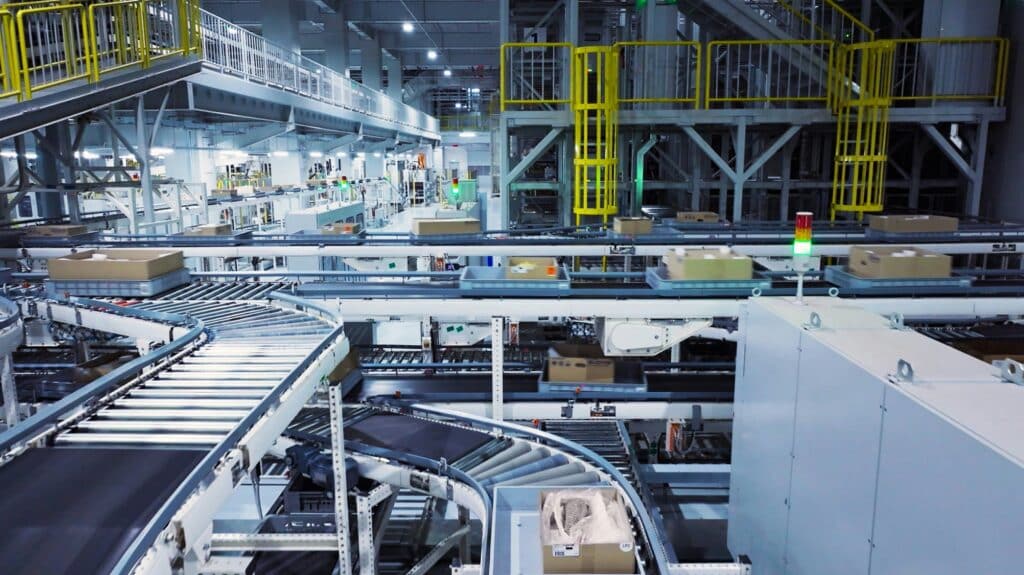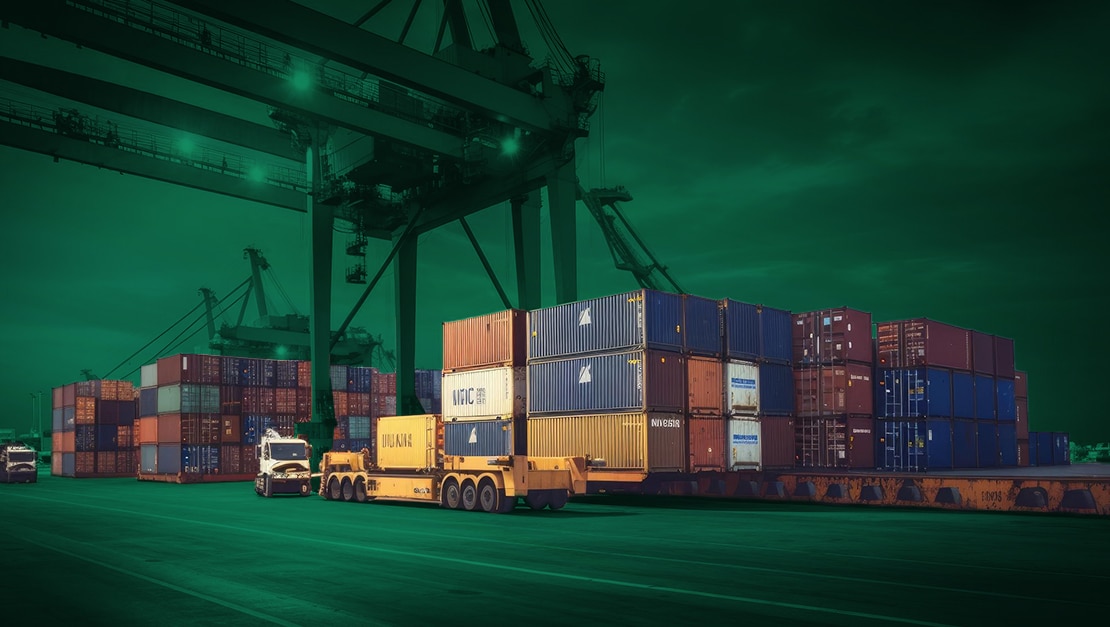Logistics is a field that requires close attention to detail, constant monitoring, and continuous improvement. With the advent of artificial intelligence (AI), many companies are able to leverage the technology to streamline critical processes.
We’re going to look at the plenty of benefits of AI in logistics and uncover how it can be applied to optimize your logistics operations.

Warehouse with machines / https://unsplash.com/
What is Logistics and AI in Logistics Anyways?
It’s a word that’s used in every business because logistics is the process of managing the flow of goods, information, and services.
AI, or artificial intelligence, is the use of machines and technology to execute activities and learn from experience without human intervention. In the world of logistics, AI is gaining popularity because it helps to automate key functions, like: inventory management, order processing, route optimization, and more.
With the use of AI tools and solutions, companies can work more efficiently, collaboratively, safely, and proactively.
Optimizing Supply Chain Operations with AI
Supply chain operations are a primary component of logistics as it is what transforms raw materials into finished products, and moves them from point A to point B.
With AI in the picture, companies are able to optimize supply chain operations in several ways, including:
Demand Forecasting and Inventory Management
AI can leverage historical data and perform analysis to forecast future demand of goods. This way, companies can better prepare to have the right amount of inventory on hand rather than holding onto a surplus, thereby saving costs.
Route Optimization and Network Planning
AI can trace and forecast the most efficient route for shipping and network planning through graph theory. By optimizing shipping routes, organizations get to save on costs, have drivers spending less time on the road during peak hours, and ultimately, can deliver goods faster which results in happier and more satisfied customers.
Warehouse Automation and Robotics
With the rise of ecommerce, warehouses have sprung up all over the place to store inventory that then gets shipped out as soon as an order is received. Top-tier stores, like Amazon, have invested greatly in robotics and warehouse automation to streamline order processing and fulfillment.
Real-time Tracking and Monitoring
With solutions that provide real-time tracking and monitoring, management teams gain visibility into logistics processes to make decisions on the spot that will benefit the organization. Rather than having to play a guessing game and spend energy on trial and error, teams have access to data and analysis to make improvements successfully.
What are the Benefits of AI in Logistics?
Now that we have an understanding of how artificial intelligence can be applied to logistics use cases, it’s time to see the impact that AI has on operations, employees, and customers alike.
Enhancing Efficiency and Cost Savings
At the end of the day, every business is looking to maximize profits and cut costs. With AI, it’s possible to:
- Streamline Transportation Management: With machine learning algorithms, companies can forecast price variation in the logistics market to then determine which carriers to use. This helps to manage shipping capacity needs at the best price using market data.
- Minimize Delays: With process automation, you no longer have to worry about key person dependencies, paper-based trails, and bottlenecks of siloed data or people. In turn, you can minimize delays.
- Reduce Labor Costs and Human Errors: While AI is not intended to fully replace humans, but rather augment their capabilities, it results in reduced labor costs and mistakes. For example, when AI is used in inventory management, it can automatically replenish orders according to customer demand trends, so you don’t need a person to manually track orders and calculate what to order when.
- Improve Resource Allocation and Utilization: Similarly, since AI is in the mix handling the tedious and repetitive tasks, humans can better allocate their time and efforts towards tasks that require human thought and strategy. This maximizes results.
Improving Customer Experience and Satisfaction
Delivering value to the end user is the tell tale sign of being able to keep a business thriving and retain customers. AI assists in bettering customer experiences by providing:
- Faster Delivery Times and On-time Performance: GPS tracking and AI-powered chatbots grant transparency to customers about where their product is in the shipping process and when they can expect it. Coupled with route optimization, setting honest expectations results in on-time performance and customer trust.
- Personalized Services and Customization: Imagine being able to customize recommended products to each customer individually. With AI, you can, and this personalized approach leads to boosted sales and less returns as you can leverage customer purchase history to better understand a customer’s likes, sizing, and style.
- Proactive Issue Resolution and Communication: Chatbots and AI can be assigned to handle customer issues, which aids in rectifying issues faster than having to wait on a human to respond.
Mitigating Risks and Ensuring Compliance
When handled manually, logistics and operations were error-prone. In certain industries, this type of risk is too large to take on, especially when it comes to compliance and regulations.
- Predictive Maintenance and Risk Management: AI-powered predictive analytics takes accurate data and extrapolates insights so that companies can be proactive in their decision-making. It also helps to evaluate future potential risks so that businesses can prioritize which risks to mitigate, avoid entirely, or accept.
- Compliance with Regulations and Standards: When it comes to logistics, many aspects of operations are regulated to protect worker safety, such as in warehouse logistics. AI can be applied to evaluate workplace safety and offer alerts for any potential dangers. Additionally, speech-enabled solutions like aiOla can be used to complete processes through the use of speech, so that workers can keep their hands-free and eyes on the task, thereby reducing safety incidents.
- Fraud Detection and Security Measures: AI can also be trained to learn what signs are indicative of fraud within data records. Rather than letting the issue persist, the solution will alert a team member to investigate and take action.

Logistics manager holding a tablet / https://www.pexels.com
Overcoming Challenges in Adopting AI in Logistics
Wherever there are advantages to be had, there may also be drawbacks. When it comes to the benefits of AI in logistics, your business may be have to face some challenges, but they are all easy to overcome as long as you are prepared for what to expect:
- Initial Investment: As with any technological solution, there tends to be an upfront investment required to be made. While it’s easy to shy away from making the initial investment in an effort to save on costs, it’s important to consider the ongoing cost savings you will receive by using AI in logistics.
- Integration: You’ll also want to find tools that work alongside your existing tech stack, especially because AI relies on the accuracy and availability of data.
- Security: Your data’s security is of utmost importance, so you’ll need to search for AI solutions that have the latest and greatest security measures to protect your information.
- Workforce Training: There may be some pushback on behalf of your team to adopt a new technology. With adequate workforce training and communication as to how the solution will ultimately benefit their work, this challenge can be minimized.
The Bottom Line
There is no doubt that AI will continue to expand its prevalence in the field of logistics. This is the case because the benefits of AI in logistics are already expansive and continue to grow with the subsequent evolution of technology. It would behoove any logistics business to be open to exploring the use of AI.
One way to get started is to utilize speech-enabled AI technology for process completion. If you’re interested in learning more about how aiOla works, we are ready to share more! The upside of aiOla is that it can understand business-specific jargon, in any accent, acoustic environment, and language, so it’s practically a tailored solution that’s ready-to-use for your specific business’ needs.








